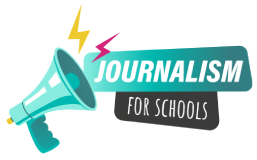National Curriculum Requirements
Journalism for Schools supports learning in many subjects not just English. It aims to meet National Curriculum requirements and attainment target levels
For example, Key Stage 3 Literacy requirements demand that pupils learn the importance of being clear, coherent and accurate in spoken and written communication which will go towards reaching their attainment target ‘competence.’ Checking accuracy is vitally important in anything which is reported to the general public.
Secondary School pupils studying Citizenship are encouraged to take an interest in topical and controversial issues going on in the outside world, and to engage in discussion and debate. Key aspects of journalism such as credibility, accuracy and diplomacy work alongside the principle of effective citizenship that young people should develop social and moral responsibility, community involvement and political literacy.
In Science pupils need to make plans and investigate, share ideas and experiences and comment and report. A parallel to a newsroom!
In PSHE – learning to report accurately on news helps students become more mature, independent and self-confident. They learn about the wider world and the interdependence of communities within it. They develop their sense of social justice and moral responsibility and begin to understand that their own choices and behaviour can affect local, national or global issues and political and social institutions.
Key Stage 4 English – students will learn to make independent judgements about how to communicate effectively and sustain formal interaction, particularly in unfamiliar contexts (competence). Sally will talk about going into unfamiliar situations, from formal meetings with politicians or government officials, to following royalty and interviewing dignitaries. Sally will talk about privacy, embargoes and ‘off the record’ policies.
The latest National Curriculum programme of study requires KS4 pupils be able to write accurately, fluently, effectively and at length for pleasure and information through:
A Journalism for Schools workshop gives students the chance to write to describe, persuade and argue and the chance to re-draft to get their work perfect.
Get In Touch
A workshop can be a full day, half day or repeater sessions. We also offer bespoke workshops written to suit your requirements, or around something happening in your school or locality.
To discuss how we could work with you please get in touch.
